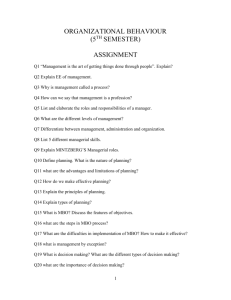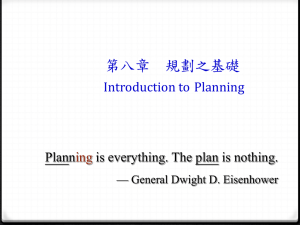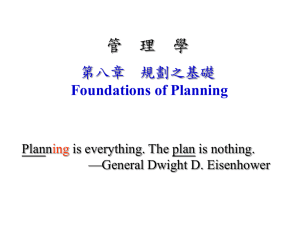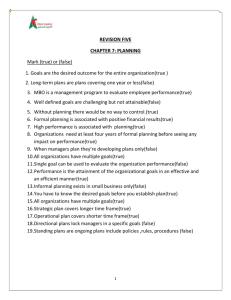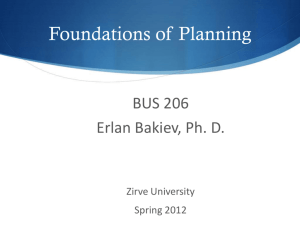index.html
advertisement
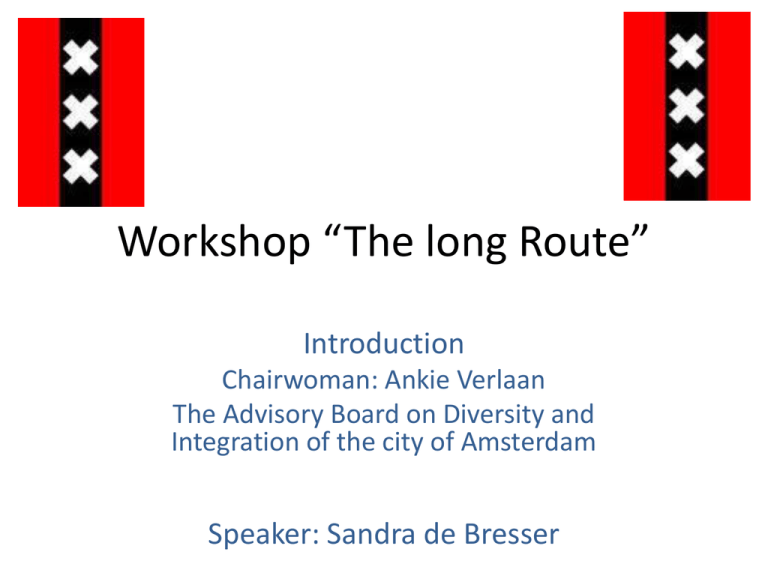
Workshop “The long Route” Introduction Chairwoman: Ankie Verlaan The Advisory Board on Diversity and Integration of the city of Amsterdam Speaker: Sandra de Bresser TIES Conference May 11-13, 2009 Sandra de Bresser Director ICT Department Historical Context • 19th century • 20th century • Industrialisation: • coming up of vocational training • Initiative of employers and big influence of the business communities • Development in the administration and public sector • ambachtschool, • huishoudschool, • grafische school • MULO Expansion of the vocational education after the Second World War Vocational Education • lts – uts – mts - hts • lhno - mhno/mdgo/fashion • leao – meao/mds • guild system General Education • Mulo - HBS • Mavo – Havo / VWO • Second chance: avond-HBS, moedermavo Stapelen (PILING) Emancipation of the working class Another vision on emancipation and development During the sixties • De middenschool • (example Scandinavia and France) • • • • • Opposition: Economic movements Conservative powers Parents Employers a political concept The Dream • The big wave: primary-secundary general - higher education • Smaller wave: vocational training-labour market • Second chance. The reality: • Psychological development takes more time (period of puberty and adolescence 11 - 20) • Different composition of the population: a new working class • Vocational education: 60% of the students (community colleges and vmbo) PILING IS BACK, the long route, royal route or a steeplechase? Necessary facilitation: • Better connection curricula • More flexibility in time and combination with work • Better coaching system • Improve the professionality of teachers • Not: more money, but a better spending policy more time - more serenity - more variety Successes: Aboutaleb, Marcouch, Abdelkader Benali, Hafid Bouazza. Dutch Education 4-5 4 University Higher Education 6 Pre University General 5 Secondary Education Vocational Training, 2-3-4 Pre Vocational Training, Incl. pre gen stream Primary Education 4 Different ways to go The longest Route The long Route The VWO Route The Havo HBO University Route Masters 1 - 2 Masters 1 - 2 Bachelor diff dom. 3 Intro 0-1 Masters 1 - 2 Masters 1 - 2 Bachelor HBO 4 Bachelor HBO 4 MBO level 2-4 3 - 4 MBO level 2-4 3 - 4 Intro 0-1 Bachelor 3 VWO Bachelor HBO 4 6 10-11 Havo 5 10-12 VMBO TL - BB 13 - 15 4 VMBO TL - BB 15-17 4 The road taken by Adnan Kazan The personal story track of a second generation Turkish immigrant • • • • MAVO (VMBO these days): 4 years MBO (short track no longer offered): 2 years HBO (fast track; MBO background): 3 years Master of Information Sciences at University: 2 years • A total of 11 years (with 2 shortcuts); normally this road would take at least 13 years or more in the current Dutch system • Tested for a higher level of secondary education (havo-vwo) but was advised to go to MBO (with his Turkish friends who all dropped out later). My personal track in comparison • VWO: 6 years • HBO / Bachelors: 4 years • University, Master of Technology of Education in USA: 1+ year • A total of 11 years (in reality 15 years because I did 2 bachelors in different subject areas) A comparison between the Dutch System and the USA (1) • During secondary education (12 – 18 years) there are no choices between general or vocational education in the USA: one system • One system for all makes it hard for the brighter students and for the more practical students in the USA, but it offers a safe social environment and often the system is referred to as a ‘social education’ rather than an intellectual education. • After High School many students go through the Community College system for their associate degree and prior to university: it is cheaper and it can be combined with work and family responsibilities (2 years) A comparison between the Dutch System and the USA (2) • Vocational education is done through Community Colleges (comparable to the Dutch MBO system) or 4 year colleges (comparable to the Dutch HBO system) • Community Colleges vocational tracks are more likely to be attended by people that work and of all ages. 4 year colleges are more likely to be attended by full time students directly out of High School • University in the USA can be attended full time or part time and many people who work also attend university for many years to finish their degree (s) and to improve their job opportunities (piling in the credit system) The road taken by Armida Carr • • • • • • • • • 2nd generation Hispanic immigrant in USA No school prior to age 8 in Mexico Started school at age 8 in the USA Finished High School with great efforts and low selfesteem Married after High School and had 3 children Went back to education at age 32 in community college / entry-level Did her associate degree (Math & English) in 2 years Enrolled into university at age 34 and finished her bachelors with honors and in another 2 years beating her deficiencies in the English language Finished her Master’s in Communications Disorders at age ‘38 Similarities between Adnan and Armida • Both 2nd generation immigrants • Both spoke another language until age 5 – 8 and continued to speak another language at home throughout their school years • Both had parents with no higher education degree then high school • Both had low self-esteem in terms of their intellectual and / or language level skills • Both did not get the push from their parents to go through the highest possible education program • Both are highly motivated and very intelligent and exception to the rule in their generation • Differences: Adnan stayed within the system and continued his path taking the long road. Armida came back into a flexible system that was able to accommodate her education goals later in life and while having a family. The ICT students of my department • About 60- 70 % continue their education in IT and go to the HBO • This is a national trend in ICT and it has a higher percentage than other vocational programs in MBO (ranges from 45 – 52 % and the average score of the Regio College is 47 %) • The other 30 – 40 % starts work and may come back for additional training through their employer or using Microsoft of Cisco Certificate Training Programs. • The students continuing into HBO do well. The drop-out rate of MBO students in IT is relatively low and the majority will finish it and get their degree. • Only a small percentage will continue into University and finish a Master. Demographics of the ICT students • Level 2: about 60- 70 % is first, second or third generation of immigrants and we have no entry requirements (prerequisites) • Level 3 – 4: about 40-50 % of second or third generation of immigrants and very few if any new immigrants (I know only one female student who graduated last year) • The majority is male and in my first year as the director of the department we only had 8 female student (out of 300 in total): 1 Dutch girl, 7 Turkish and Moroccan students. Now even less despite of attempts to attract more… What do we do right (in our system)? • Government: requirement to get a minimal qualification (start kwalificatie) until the age of 23 (was implemented some years ago) • Government: (financial) initiatives to reduce the drop-out rates in Amsterdam and Rotterdam (the larger cities with many immigrants) What do we do right in our College? • We work closely with the VMBO colleges in our region to create a ‘continued education program’ rather then making it a transition from one college to the next. Housed in one building by next September in Purmerend. • We work closely with the HBO Colleges on fast tracks from MBO into HBO and joint counselling of students to make the right choices (memorandum of understanding and dual half-year programs) • Stapover, a special program where students who can’t make the choice for a specific profession or who made the wrong choice, can orient themselves to make a better founded decision & Service Centre with counsellors for learning difficulties What still needs to be improved in the system? (1) • Language deficiency of immigrants is still a huge problem in their primary and secondary education and blocks their ability to transfer into higher education or using the easier and shorter route • After NT2 (Dutch as a Second Language) and VMBO there is still a ‘gap’ of at least 2-3 levels of language skills to be bridged to be able to finish the level 4 programs and to meet the language requirements (especially with technical students and only one level can be improved in that time frame) • Programs and funding to bridge this gap do not apply for many of my students or are offered too late in their education track. The department itself does not have the financial means nor the skilled language instructors. What still needs to be improved in the system? (2) • The MBO system goes through continuous changes and there is no time for reflection and improvement of the existing program (new KD’s or requirements imposed for the past 3-4 years) • Funding is based on student success and outcome which leaves little room or means for the individual student who needs more time or special attention. • Following rules & regulations ‘on paper’ are perceived as more important then the quality of teaching and learning. What still needs to be improved in the system? (3) • Going through ‘tracks’ rather than offering flexibility or ‘education on demand’; there is very little or no flexibility in our system and it is very hard to get back into it after having ‘dropped out’ or starting work • Teachers are insufficiently equipped to deal with difficult students and learning deficiencies or social-and / or psychological problems • Each student gets the same program. We need more tailor-made and more diversified programs (if only in pace, time and place) Lessons learned & recommendations • From a historical & administrative point of view (Ankie) • From the day to day practice in MBO and in comparison to working experience in the community colleges system (Sandra) The Long Route - the long & winding road Any questions or comments? • Beatles: For more information • Sandra de Bresser Director ICT Department Regio College Zaandam Phone: + 31-75-681-9024 Mobile: + 31-6-1250-9888 E-mail: SdeBresser@RegioCollege.nl • Reference: Global Development of Community Colleges, Technical Colleges, and Further Education Programs. Community College Press of AACC. Thank you!
